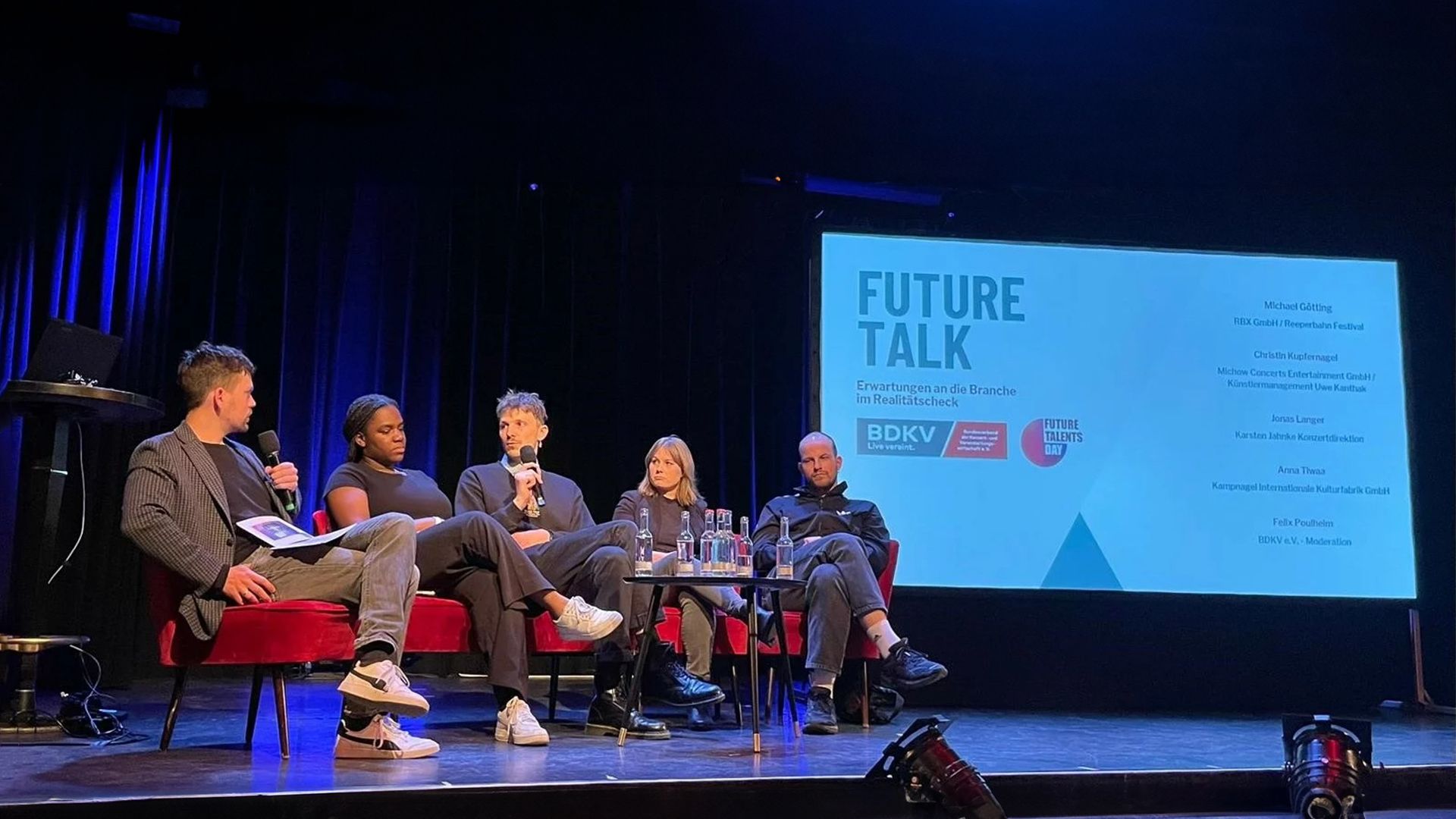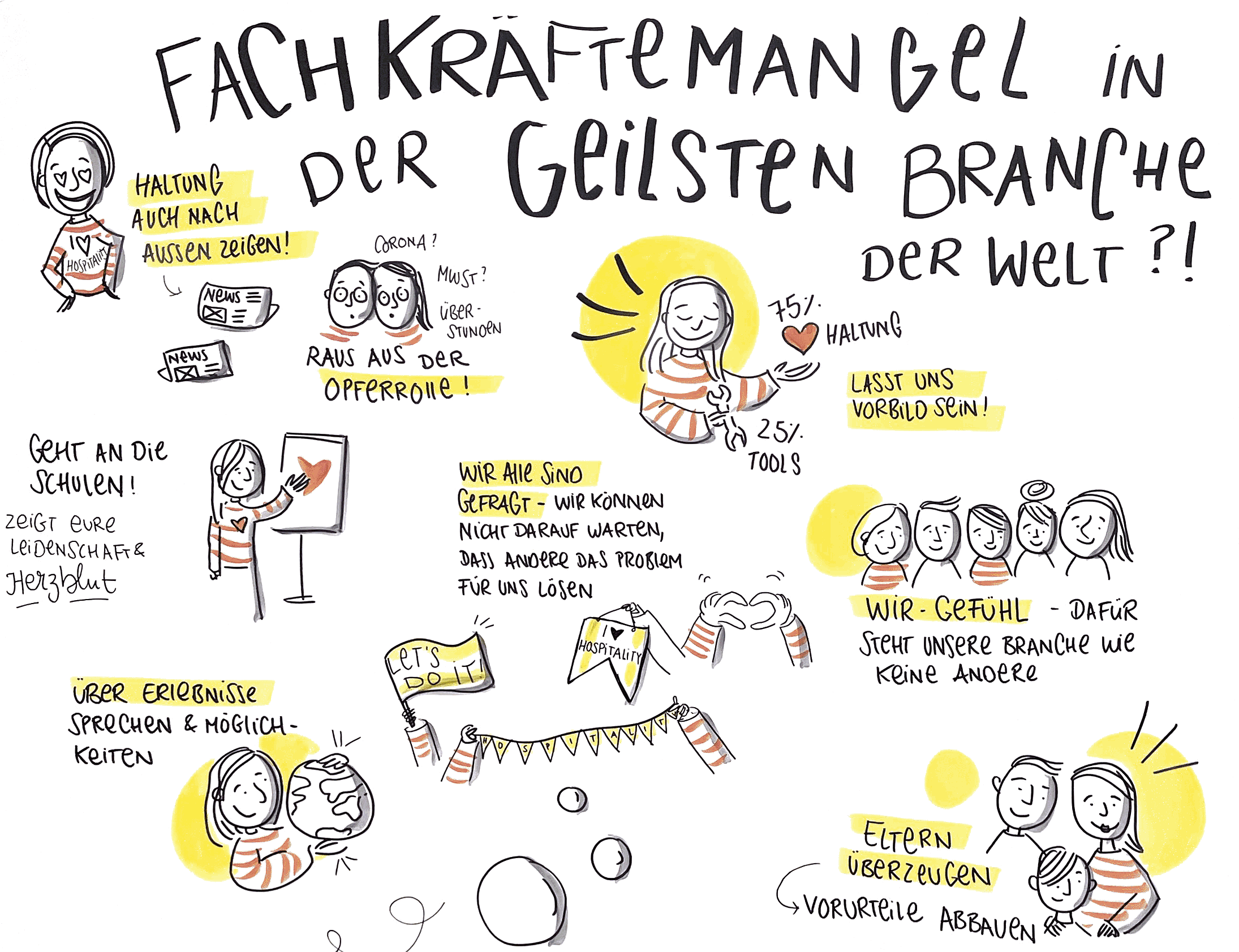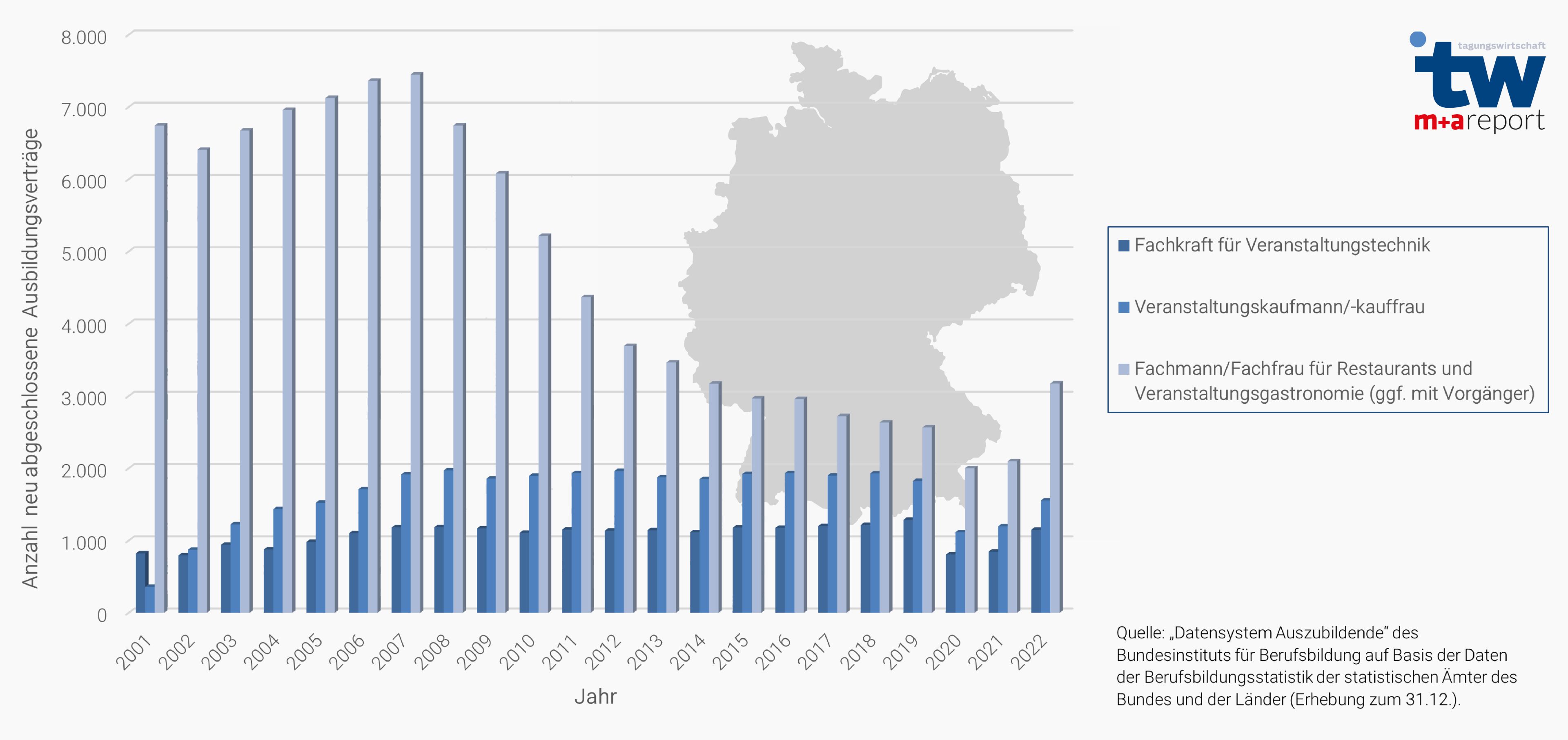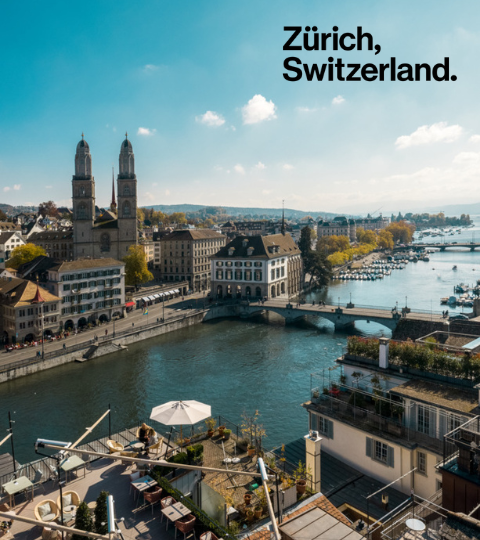
Skills shortage in the event industry
A matter of attitude
The associations in the Forum Veranstaltungswirtschaft (EVVC, VPLT and BDKV) regularly organise the Future Talents Day. The next edition will take place on 20 September 2024 at the Reeperbahn Festival for 9th and 10th grade students. The "Future Talk: A reality check on expectations of the industry" at Meet Hamburg 2024 focussed on the needs of young employees. Photo: BDKV - Federal Association of the Concert and Event Industry
The associations in the Forum Veranstaltungswirtschaft (EVVC, VPLT and BDKV - Bundesverband der Konzert- und Veranstaltungswirtschaft e.V.) regularly organise the Future Talents Day. The next edition will take place on 20 September 2024 at the Reeperbahn Festival for 9th and 10th grade students. The "Future Talk: A reality check on expectations of the industry" at Meet Hamburg 2024 focussed on the needs of young employees. Photo: BDKV
With the start of autumn, the new cohorts of trainees and students are taking their first steps in the event industry. What is an exciting start to the professional world for the young talents could become a stress test for the industry. Because just when companies' capacity utilisation is at its peak, the shortage of skilled workers can be clearly felt in the weeks of September.
The looming shortage of skilled labour is an issue that has been gaining momentum in many sectors of the German economy for years. With more than one million jobs, the event industry, which not only contributes to cultural diversity with its trade fairs, congresses, conferences and events, but also makes a significant contribution to Germany's economic performance, has been particularly susceptible to the effects of a lack of personnel, and not just since coronavirus. "The event industry is an industry in which people come together, but we also need people who organise events, who run events, who offer services," said Matthias Schultze, Managing Director of the GCB German Convention Bureau e.V., at the presentation of the results of the Meeting & EventBarometer 2023/2024 in April.
He will be joined by the representatives of the two co-initiators Matthias Hickl, Head of Business Intelligence at the German National Tourist Board (GNTB), and Ilona Jarabek, President of the European Association of Event Centres (EVVC) and Managing Director of the Musik- und Kongresshalle Lübeck (MuK). Together, they put the key figures of the study, which analyses the entire congress and event market in Germany every year, into context. With the increase in both the volume of events and the number of participants, the upward trend in the German event market is more positive than expected: Growth remains stable, provider companies and organisers are confident for 2024.
Advertisement
He will be joined by the representatives of the two co-initiators Matthias Hickl, Head of Business Intelligence at the German National Tourist Board (GNTB), and Ilona Jarabek, President of the European Association of Event Centres (EVVC) and Managing Director of the Musik- und Kongresshalle Lübeck (MuK). Together, they put the key figures of the study, which analyses the entire congress and event market in Germany every year, into context. With the increase in both the volume of events and the number of participants, the upward trend in the German event market is more positive than expected: Growth remains stable, provider companies and organisers are confident for 2024.

Graphic recording of the session "Skills shortage in the hottest industry in the world" at HotelCamp 2023. Last year, 61.5 per cent of all seminars, conferences and congresses took place in conference hotels, for which staff shortages play a particularly important role in day-to-day business. Photo: Hospitality Sales & Marketing Association Deutschland e.V. (HSMA)
Finally, there are also signs of a slight easing in the personnel sector for the first time since the massive coronavirus crisis. While more than half of all event venues were unable to cover their staffing needs last year, only around a third of them are currently still looking for the right employees. "On the one hand, I find it very reassuring that the situation has eased somewhat, but of course this should not blind us to the fact that we still have major challenges in the area of personnel, because of course we need skilled workers to be able to organise good and safe events," says Jarabek, assessing the development with regard to the industry's further growth potential. "So in this respect, the topic is very topical."
The EVVC President is aware of the major challenges facing industry players. Inflation and the associated price increases as well as staff shortages will probably continue to be of great importance for providers as well as organisers from Germany and the rest of the world in the near future. "The fact is that we must continue to actively recruit skilled labour and, above all, promote young talent," explains the Lübeck native. Achim Dercks, Deputy Managing Director of the German Chamber of Industry and Commerce (DIHK), agrees with this opinion: "The shortage of skilled workers starts with trainees," he comments on the new Training Survey 2024, which was published at the beginning of August.

The number of new training contracts concluded for the training occupations of event technology specialist and event management specialist compared to restaurant and event catering specialist (nationwide): Before the Corona slump, the figures had remained relatively constant since 2010. R.I.F.E.L. e.V. estimates 28,000 trainees across all age groups and apprenticeships in the event industry. Graphic: tw tagungswirtschaft
According to the projection, around 30,000 companies in Germany did not receive a single application for a vacant training place last year. This means that almost every second training company in the area of the Chambers of Industry and Commerce (IHKs) was unable to fill the vacancies it offered - an absolute negative record. And so the demographic development of society does not stop at the availability of qualified specialists in the event industry. "Good employer branding and high-quality training structures are the order of the day," continues Jarabek. "We have also developed a relatively large number of tools for this purpose, such as 100Pro, where you can pledge to stand up for good training."
The training initiative 100Pro was launched by the EVVC back in 2016 in cooperation with the associations Association of the German Trade Fair Industry (AUMA), VPLT - The Association for Media and Event Technology and fwd: Bundesvereinigung Veranstaltungswirtschaft e.V. (then FAMAB) and is now the full responsibility of the Interessengemeinschaft Veranstaltungswirtschaft e.V. (IGVW). To date, 73 training companies, eleven colleges and universities and five further education institutions have signed the code that applies to them. In doing so, the organisations have committed themselves to complying with defined minimum requirements aimed at ensuring, improving and making the quality of vocational training in the event industry more transparent.
Christian Stein-Kalesky (Photo: tristar Hotel Group) & Anna Heuer (Photo: HSMA)
"Good employer branding also requires good working conditions."
Anna Heuer, Managing Director of the Hospitality Sales & Marketing Association Deutschland e.V. (HSMA), and Christian Stein-Kalesky, Head of People & Culture Europe at tristar GmbH and Head of HR & Employer Branding at HSMA Deutschland e.V., on appreciation, good leaders and opportunities to fulfil expectations.
This includes measures such as structured training planning, regular feedback meetings and the involvement of trainees in all relevant work processes, as well as regular further training for trainers - as is also the case at 100Pro supporter mainzplus Citymarketing GmbH: "Our trainees pass through all relevant departments of our company, i.e. the Congress, Culture, Marketing, Sales, Management Office, Tourism and Accounting departments. We give them responsibility at an early stage," say Marc André Glöckner and Katja Mailahn, Managing Directors of the company. With the independent organisation of real events and trade fair appearances, such as at the Berufsinformationsmesse (BIM) Rheinhessen in September, the career starters should be able to benefit from practice-oriented training.
An apprenticeship at Mainz City Marketing is preceded by a mandatory, usually three-month paid internship. This allows applicants to familiarise themselves with the company and ensure that they can identify with the diverse requirements and tasks. "In the last 16 years, we have only ever had one apprentice drop out in this way," explain the Mainz-based company. Flat hierarchies, an open corporate culture with "you" as the corporate language, a mentoring system and the use of modern tools such as the learning platform azubi:web are intended to help integrate the young trainees into the existing team - and promote their self-determined learning. The DMO was recognised for its commitment as an "Outstanding Training Company" by the Rheinhessen Chamber of Industry and Commerce.
The fact that the subsidiary of the Rhineland-Palatinate capital offers a wide range of training occupations such as marketing communication clerks, office management clerks, tourism and leisure clerks, event clerks for the congress and culture sectors, as well as dual study programmes in the fields of tourism and trade fair, congress and event management, also shows how the need for skilled workers manifests itself on several levels. On the one hand, there is the quantitative shortage, which has been exacerbated by demographic factors and the withdrawal of many experienced employees from the industry since coronavirus. On the other hand, there is an increased demand for highly qualified specialists due to rising qualification requirements.
From skills shortage to skills shortage
In order to counter this qualitative shortage - caused primarily by the professionalisation and internationalisation of the industry as well as the new professional fields associated with digitalisation and artificial intelligence - training and further education content is needed that is tailored to the specific requirements of the industry and market. Expected detailed knowledge and skills in dealing with complex IT structures and planning software, social media, networks as the basis for streaming solutions, for example, as well as technologies for virtual studios or augmented and virtual reality meet sought-after personal skills such as teamwork, empathy and a feel for customer problems.
As early as 2019, i.e. before the digital development accelerated by the pandemic and the migration of personnel to other industries, the study Professional profile of event and trade fair managers, which was initiated by Prof Dr Cornelia Zanger, Chemnitz University of Technology, and the Studieninstitut für Kommunikation GmbH, identified deficits in almost all areas of expertise among existing specialists. Young graduates in particular often lacked practical project experience, while their colleagues with practical experience often showed a need to catch up from a strategic and conceptual perspective. For Zanger, the compelling consequence is that "lifelong learning" must increasingly be understood as a company investment in its own employee expertise.

The AXICA Congress and Conference Centre in Berlin is currently publishing an "Appreciation Post" on Instagram once a week to publicly recognise the work of the various teams. Photos: Instagram AXICA
This requires companies to create an appreciative culture in which the continuous development of employees is not only encouraged, but actively shaped. Sustainable personnel development and retention play a central role in this, aiming to harmonise the individual strengths and interests of employees with the strategic goals of the company. Such an approach requires tailor-made programmes and clear milestones in the development process, which are reviewed and adjusted at regular intervals. Regular staff appraisals, which take into account not only the needs but also the personal life situation of employees, are also essential in order to promote their intrinsic motivation.
Another practical side effect is that new target groups can - and must - be addressed with evolving job profiles in recruitment. According to estimates, there is currently a shortage of around 400,000 employees in the heterogeneous fields of activity in the event industry due to the coronavirus pandemic and the personnel requirements that existed before it. IGVW President Marcus Pohl sees the problem in the confusing market environment: "There is no economic sector that has the same name or even an economic sector number in the NACE system. This means that our companies are spread across 76 economic sectors, the economic strength is not recognised because it is not measured, so there are no statistics and, accordingly, there is no functioning labour market as we know it from other economic sectors."
Job centres and jobseekers rarely find vacancies in companies. "This has to do with inappropriate support programmes for the labour market, but also with inappropriate queries about qualifications," adds Pohl. Based on this, the IGVW began last year as part of the "Future Germany" campaign with the platform www.nx-gen.de to create a systematisation of professions within the industry with the aim of presenting them in a comprehensible and attractive way. In addition to defining the skills required in each case, this also includes information on training and further education opportunities.
The "jewel" in corporate communications"
According to Pohl, the main concern is that "we install forward-looking paths that make it possible for migrants, refugees, career changers and lateral entrants to find a way into the event industry, that pupils can discover their profession in our training occupations and that the event industry builds resilience". In order for the industry to communicate even better in the recruitment market and stand out from the competition with other providers in the private or public sector, there is no way around a positive corporate culture. Like other sectors, the event industry must meet the changing expectations of the workforce - especially in view of the high performance requirements and workload.
Guide for companies: Attracting and retaining labour
In July 2024, the European Association of Event Centres (EVVC) published an updated collection of best practices from its members. The guide provides a compact overview of topics such as attractiveness as an employer, employer branding, recruiting, training and employee retention. The collection serves as a practical aid for companies in the event industry to attract and retain skilled workers in the long term.
With them, the flexibility and individualisation of employment models are increasingly expected. Issues such as fair pay and remuneration systems, work-life balance, work-life balance, the possibility of working from home and flexible arrangements for compensating overtime, as well as a changed understanding of values such as social or environmental sustainability, are therefore not only becoming a focus for younger generations. In order to gain an overview of the current framework conditions, event agencies, trade fair construction companies, event departments and the five service sectors of IT service providers, technical service providers, catering, venues and outfitters have been surveyed by fwd: Bundesvereinigung Veranstaltungswirtschaft for a HR & Salary Report over the past two years.
"The event industry is on its way to quickly overcoming the coronavirus crisis. It can be considered an attractive employer with a lot of development potential for its employees," says Markus Illing, CEO of fwd:, delighted with the results: The vast majority of companies pay well and offer flexible working time models, with over 80 per cent having introduced home office options into working life. Across all areas, employees have two training days per year at their disposal, for which the companies grant an average of over 1,000 euros. Additional fringe benefits include company mobile phones, work clothing, company cars or bicycles, coaching opportunities, public transport cards, health measures and childcare.
These are good prerequisites for building a strong employer branding in the event industry. And what better way for event professionals to create positive experiences and working conditions that strengthen the company's reputation than by organising employee events? Or as Matthias Schultze summarises: "How can we live corporate culture when people work from home and don't spend many days in the office in person? - We have clearly realised that the event has even gained in value and importance as a real instrument of corporate communication. I think it's such a nice term to describe the event as the jewel in the crown of the entire corporate communications palette."
New for our international readers:
For the first time, we are offering an English version of our magazine in addition to the German edition. The translation was made with the help of AI and is currently in the test phase. We’d love to hear your feedback on this new service!

